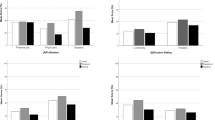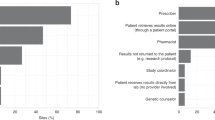Abstract
Increasing enthusiasm for clinical pharmacogenetic testing and the availability of pharmacogenetic-based guidelines indicate that pediatricians will increasingly be expected to interpret and apply pharmacogenetic test results into medical care. Previous studies have identified a lack of knowledge on pharmacogenetics across many physician specialties; however, this has not been systematically assessed among pediatricians. To evaluate pediatrician knowledge, attitude, and educational interest in pharmacogenetics, we surveyed physician cohorts from both the United States (U.S.) and Japan. A total of 282 pediatricians (210 from the U.S. and 72 from Japan) participated in an anonymous survey (online or hardcopy) on pharmacogenetics knowledge, perception, and education. Over 50% of all respondents had >10 years of clinical experience and >75% had some prior education in genetics. However, <10% felt they were familiar with pharmacogenetics, which was very consistent with <20% of the U.S. pediatricians correctly responding to a codeine/CYP2D6 pharmacogenetics knowledge question and <10% of U.S. pediatricians being aware of the Clinical Pharmacogenetics Implementation Consortium (CPIC). Despite being generally unfamiliar with pharmacogenetics, >80% of all respondents indicated that implementation of clinical pharmacogenetic testing will improve efficacy and safety, and that pediatricians should be capable of applying this testing to their practice. Moreover, the majority (83.1%) were interested in educational opportunities on pharmacogenetics, particularly on result interpretation and therapeutic recommendations. Taken together, these data indicate that although practical knowledge of pharmacogenetics among pediatricians in the U.S. and Japan is currently very low, their interest in clinical pharmacogenetics and related education is high, which will likely facilitate future implementation.
This is a preview of subscription content, access via your institution
Access options
Subscribe to this journal
Receive 12 print issues and online access
$259.00 per year
only $21.58 per issue
Buy this article
- Purchase on Springer Link
- Instant access to full article PDF
Prices may be subject to local taxes which are calculated during checkout

Similar content being viewed by others
References
Dunnenberger HM, Crews KR, Hoffman JM, Caudle KE, Broeckel U, Howard SC, et al. Preemptive clinical pharmacogenetics implementation: current programs in five US medical centers. Annu Rev Pharm Toxicol. 2015;55:89–106.
Rasmussen-Torvik LJ, Stallings SC, Gordon AS, Almoguera B, Basford MA, Bielinski SJ, et al. Design and anticipated outcomes of the eMERGE-PGx project: a multicenter pilot for preemptive pharmacogenomics in electronic health record systems. Clin Pharm Ther. 2014;96:482–9.
Shehab N, Lovegrove MC, Geller AI, Rose KO, Weidle NJ, Budnitz DS. US Emergency Department visits for outpatient adverse drug events, 2013-2014. J Am Med Assoc. 2016;316:2115–25.
Chidambaran V, Sadhasivam S, Mahmoud M. Codeine and opioid metabolism: implications and alternatives for pediatric pain management. Curr Opin Anaesthesiol. 2017;30:349–56.
Hudak ML. Codeine pharmacogenetics as a proof of concept for pediatric precision medicine. Pediatrics. 2016;138. pii: e20161359.
Ieiri I. What are barriers to pharmacogenomics (PGx) clinical uptake? Drug Metab Pharmacokinet. 2012;27:279.
Scott SA. Personalizing medicine with clinical pharmacogenetics. Genet Med. 2011;13:987–95.
Stanek EJ, Sanders CL, Taber KA, Khalid M, Patel A, Verbrugge RR, et al. Adoption of pharmacogenomic testing by US physicians: results of a nationwide survey. Clin Pharm Ther. 2012;91:450–8.
Relling MV, Klein TE. CPIC: Clinical Pharmacogenetics Implementation Consortium of the pharmacogenomics research network. Clin Pharm Ther. 2011;89:464–7.
Relling MV, Klein TE, Gammal RS, Whirl-Carrillo M, Hoffman JM, Caudle KE. The Clinical Pharmacogenetics Implementation Consortium: 10 years later. Clin Pharmacol Ther. 2020;107:171–5.
Berg JS, Agrawal PB, Bailey DB, Jr., Beggs AH, Brenner SE, Brower AM, et al. Newborn sequencing in genomic medicine and public health. Pediatrics. 2017;139. pii: e20162252.
Holm IA, McGuire A, Pereira S, Rehm H, Green RC, Beggs AH, et al. Returning a genomic result for an adult-onset condition to the parents of a newborn: insights from the BabySeq project. Pediatrics. 2019;143:S37–S43.
Haga SB, Burke W, Ginsburg GS, Mills R, Agans R. Primary care physicians’ knowledge of and experience with pharmacogenetic testing. Clin Genet. 2012;82:388–94.
Johansen Taber KA, Dickinson BD. Pharmacogenomic knowledge gaps and educational resource needs among physicians in selected specialties. Pharmgenomics Pers Med. 2014;7:145–62.
Lu M, Lewis CM, Traylor M. Pharmacogenetic testing through the direct-to-consumer genetic testing company 23andMe. BMC Med Genomics. 2017;10:47.
Haga SB, O’Daniel JM, Tindall GM, Mills R, Lipkus IM, Agans R. Survey of genetic counselors and clinical geneticists’ use and attitudes toward pharmacogenetic testing. Clin Genet. 2012;82:115–20.
Mills R, Haga SB. Clinical delivery of pharmacogenetic testing services: a proposed partnership between genetic counselors and pharmacists. Pharmacogenomics. 2013;14:957–68.
McCullough KB, Formea CM, Berg KD, Burzynski JA, Cunningham JL, Ou NN, et al. Assessment of the pharmacogenomics educational needs of pharmacists. Am J Pharm Educ. 2011;75:51.
Amstutz U, Carleton BC. Pharmacogenetic testing: time for clinical practice guidelines. Clin Pharm Ther. 2011;89:924–7.
Relling MV, Evans WE. Pharmacogenomics in the clinic. Nature. 2015;526:343–50.
Zineh I, Lesko LJ. Pharmacogenetics in medicine: barriers, critical factors and a framework for dialogue. Per Med. 2009;6:359–61.
Watanabe M, Ohata T, Muto K, Takada F. Problems in the regulation of genetic tests in Japan: what can we learn from direct-to-consumer genetic tests? Public Health Genomics. 2010;13:327–35.
Suematsu K. Japan Pharmacogenomics Data Science Consortium database and its application for drug safety analyses. Curr Dermatol Rep. 2016;5:1–4.
Kamitsuji S, Matsuda T, Nishimura K, Endo S, Wada C, Watanabe K, et al. Japan PGx Data Science Consortium Database: SNPs and HLA genotype data from 2994 Japanese healthy individuals for pharmacogenomics studies. J Hum Genet. 2015;60:319–26.
Kobayashi E, Sakurada T, Ueda S, Satoh N. Public involvement in pharmacogenomics research: a national survey on patients’ attitudes towards pharmacogenomics research and the willingness to donate DNA samples to a DNA bank in Japan. Cell Tissue Bank. 2011;12:71–80.
Green JS, O’Brien TJ, Chiappinelli VA, Harralson AF. Pharmacogenomics instruction in US and Canadian medical schools: implications for personalized medicine. Pharmacogenomics. 2010;11:1331–40.
Hoffman JM, Haidar CE, Wilkinson MR, Crews KR, Baker DK, Kornegay NM, et al. PG4KDS: a model for the clinical implementation of pre-emptive pharmacogenetics. Am J Med Genet C Semin Med Genet. 2014;166C:45–55.
Luzum JA, Pakyz RE, Elsey AR, Haidar CE, Peterson JF, Whirl-Carrillo M, et al. The pharmacogenomics research network translational pharmacogenetics program: outcomes and metrics of pharmacogenetic implementations across diverse healthcare systems. Clin Pharm Ther. 2017;102:502–10.
Bell GC, Crews KR, Wilkinson MR, Haidar CE, Hicks JK, Baker DK, et al. Development and use of active clinical decision support for preemptive pharmacogenomics. J Am Med Inf Assoc. 2014;21:e93–9.
Acknowledgements
The authors would like to thank Stacey Gray, from the Nemours Biomedical Research Department, for coordinating the administration of the Nemours physician survey.
Author information
Authors and Affiliations
Corresponding author
Ethics declarations
Conflict of interest
SR, YS, and SAS are paid employees of Sema4.
Additional information
Publisher’s note Springer Nature remains neutral with regard to jurisdictional claims in published maps and institutional affiliations.
Supplementary information
Rights and permissions
About this article
Cite this article
Rahawi, S., Naik, H., Blake, K.V. et al. Knowledge and attitudes on pharmacogenetics among pediatricians. J Hum Genet 65, 437–444 (2020). https://doi.org/10.1038/s10038-020-0723-0
Received:
Revised:
Accepted:
Published:
Issue Date:
DOI: https://doi.org/10.1038/s10038-020-0723-0
This article is cited by
-
Challenges of pediatric pharmacotherapy: A narrative review of pharmacokinetics, pharmacodynamics, and pharmacogenetics
European Journal of Clinical Pharmacology (2024)
-
Pharmacogenetics: Knowledge assessment amongst Syrian pharmacists and physicians
BMC Health Services Research (2021)
-
Clinical Utility of Pharmacogenomic Data Collected by a Health-System Biobank to Predict and Prevent Adverse Drug Events
Drug Safety (2021)



